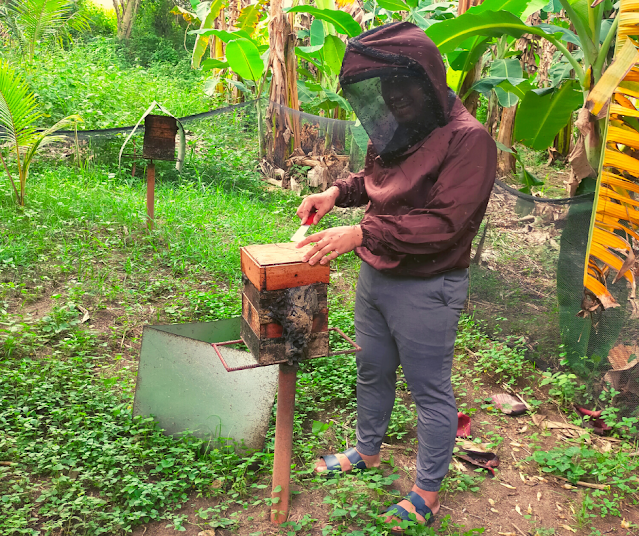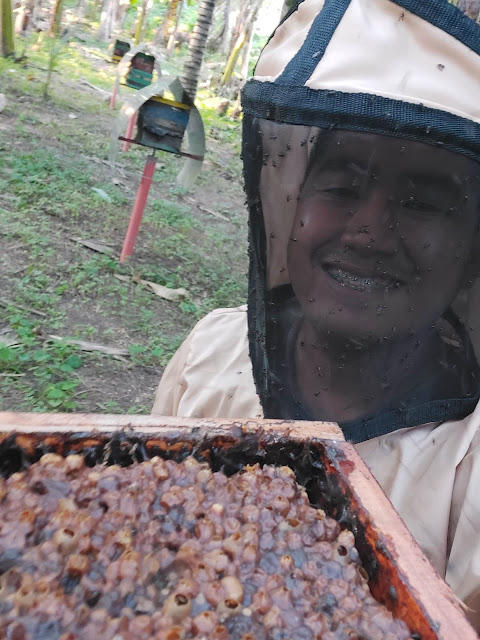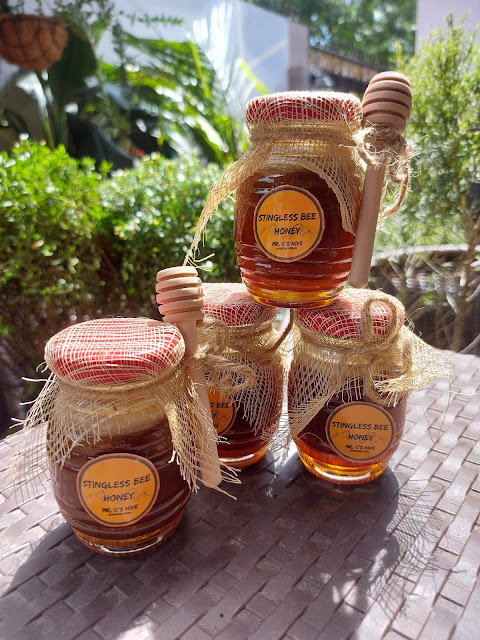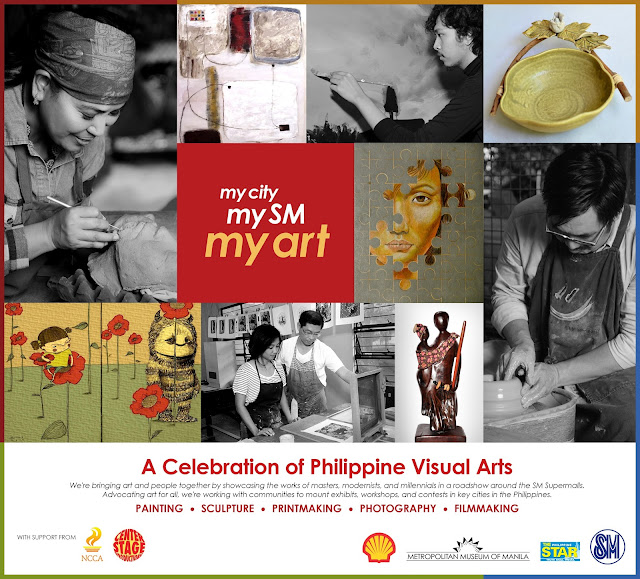Charles Lance Estocapio’s Beekeeping Venture and Advocacy
When Charles Lance T. Estocapio entered a young farmers' competition, he never could have imagined the doors it would open for him. Despite having a background in tourism management and being mostly exposed to the hospitality industry, Estocapio's passion for agriculture never wavered. Now, with new opportunities at his fingertips, he is more determined than ever to turn his dream into a reality.
"I engaged in bee farming because most consumers have concerns about the authenticity of honey. I want to provide the market with pure and reliable honey that they could see being produced on my farm. This would also help the environment by increasing farm productivity through effective pollination," Estocapio said.
Estocapio's bee farm is situated in Purok 4, Bulol Awang, Barangay Tokawal, Alabel, Sarangani Province. At his farm, he focuses on cultivating Tetragonula biroi, commonly known as "kiyot," which is a native stingless bee species in the Philippines.
While kiyot bees produce less honey compared to the widely known western honeybee (Apis mellifera), they excel in producing propolis, a resin-like substance with significant medicinal and therapeutic potential. Estocapio not only promotes beekeeping as a livelihood opportunity but also highlights its environmental benefits.
"I am passionate about promoting beekeeping as an advocacy. I want to educate people about the practice and raise awareness about its benefits for the environment," he said.
On joining Young Farmers Challenge
The Young Farmers Challenge (YFC) is a competitive financial grant assistance program by the Department of Agriculture for youth who engage in new agri-fishery enterprises.
Estocapio first learned about YFC through his friend on social media. He won the competition and that was the start of his journey. He had no prior knowledge of bee farming and learned most of what he knows from YouTube. He received a total of 200,000 pesos from the YFC, with 50,000 pesos at the provincial level and 100,000 pesos at the regional level.
After winning the YFC, he dedicated himself to further his knowledge and skills in bee farming. In the span of one year, he attended numerous trainings and seminars, such as the Bee Program at the University of the Philippines Los Baños (UPLB).
"Participating in YFC was a great opportunity for me to learn about farming and appreciate the satisfaction of producing my products. I also had the chance to meet other young farmers in the region. We share ideas and best practices. Somehow we formed a group of farmer friends who helped each other and expanded our knowledge together," he said.
"In the span of one year, I gained a wealth of knowledge and experience in beekeeping. I learned to appreciate the small things and the intricate details involved in the practice."
As one of the provincial and regional winners of YFC, Estocapio knows that the real challenge begins after the competition. It takes hard work and dedication to continue pursuing his goals and making a difference in the agricultural industry.
The bee challenge and its skepticism
Estocapio faced several challenges in his beekeeping journey. One of the biggest challenges was the weather, as his farm experienced bad weather conditions that affected his bees and their productivity. He also faced skepticism from some people who questioned the authenticity of the honey he produced.
However, this also sparked curiosity and led to more inquiries about his farm and his practices. He welcomed visitors to his farm and was always willing to share his knowledge and educate others about beekeeping.
Estocapio is also concerned about the practices of bee hunters, who often use unsustainable methods when harvesting wild honey from the forest. These practices can negatively affect both the environment and the bee population.
Another challenge facing beekeeping in the Philippines is habitat loss and degradation. This issue is often linked to the absence of established standards for bee hunting and trade practices.
Estocapio observes that the older generation of farmers is often not open to new ideas and farm technology. This can create conflict with young farmers who want to implement modern methods. The older generation still prefers traditional ways of farming.
That is why he integrates other crops, such as coconut and banana, into his bee farm. This integration creates a bee pasture - an open area with a variety of flowering plants that is essential for beekeeping. The flowers of the coconut and banana plants, which bloom when the plants begin to bear fruit, provide a good source of food for the bees. Additionally, the presence of bees on the farm helps to pollinate his crops, improving their yields.
Maintaining the bee pasture is crucial because the bees rely on its output and quality to thrive and produce high-quality honey. The presence of bee pasture in his community also benefits neighboring farms, such as the mango farm, by improving their yields.
At present, he maintains 17 bee colonies on his farm and is planning to split the beehives. This technique involves dividing one hive into two to increase the number of bee colonies. Stingless bees can produce an average of 1-2 liters of honey, while European bees, such as Apis mellifera, can produce up to 30 liters. Honey can be harvested once or twice a year.
According to Estocapio, stingless bees are relatively low maintenance compared to other types of livestock. Unlike other animals, they do not require regular feeding or chemical inputs to thrive. Instead, beekeepers only need to monitor their hives frequently to prevent intruders and predators, such as spiders, lizards, toads, and ants.
However, the certification process for honey is not easy. The certifying body requires a lab test, which can be expensive. Currently, there is no alternative way to determine the quality of honey except through a lab test.
Looking Forward
Estocapio has received a lot of support for his beekeeping venture. Many people are willing to help develop the project, including his YFC friends and the Office of the Municipal Agriculturist of Alabel. This gives him the motivation to continue, unlike others who may not have as much support.
One of his beekeeping mentors, Leo Grajo, advised him to never stop learning. Estocapio took his words to heart and applies this principle in his beekeeping practices.
"What I like about the challenge of farming is that you always learn something new. When you appreciate the word 'learning,' you always look for it," he said.
Edwin Fetalino, the owner of Farm Feta Integrated Farm and Technical Institute Inc., also serves as a mentor to him. Fetalino has taught him about beekeeping and is a strong advocate for spreading awareness and knowledge about the practice, particularly about our endemic bee species.
Estocapio is currently employed at PhilExport Region 12 but has plans to resign and fully pursue his passion for beekeeping.
"I want to envision the bee farm being recognized not only in Sarangani but also in the entire region. I want it to be a pioneering bee farm in Sarangani Province."
Estocapio has big plans for his bee farm. He envisions it as a learning site where people can discover the benefits of beekeeping, including its positive impact on the environment, increased farm productivity, and potential as an alternative source of income. He hopes to inspire others to explore beekeeping.
"Never stop learning. Farming can be very challenging, so it's important to be persistent and have patience. Don't just think of it as a business, but also as a hobby. If you enjoy it, pursue it. If an opportunity arises, seize it."
"My goal is to encourage young people, especially those with parents who are farmers, to get involved in agriculture."
______
Watch the vlog:








Comments
Post a Comment
The author encourages readers to post sensible comments in order to have meaningful discussions. Posting malicious, senseless and spam comments are highly discouraged.
Thank you for reading Yadu Karu's Blog.